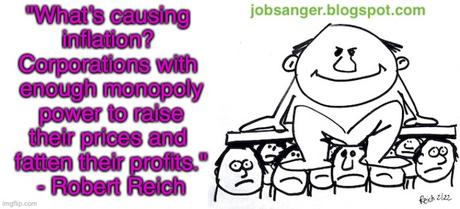
In the following post, Robert Reich discusses the real cause of inflation, and how to fix it:
The economic goal should be more jobs at higher wages. Right?
Yet the Fed, corporate economists, and the GOP have turned the goal upside down — into fewer jobs and lower wages. Otherwise, they say, we’ll face more inflation.
Rubbish.
This upside-down logic is pushing the United States economy toward a recession, which could hit about the same time as the next presidential election — which will make Joe Biden a one-term president, just as Fed-induced recessions made Jimmy Carter and George H. W. Bush one-term presidents.
None of this is necessary.
The Fed has raised borrowing costs at 10 consecutive meetings, pushing its benchmark rate to over 5 percent. Yet inflation has barely budged. In April, it dropped to 4.9 percent (year-over-year) from 5 percent in March — according to Wednesday’s Labor Bureau data.
Why are the Fed’s rate hikes having so little effect?
Because inflation is not being propelled by an overheated economy. It’s being propelled by overheated profits.
Wage gains still lag behind price increases. Average hourly earnings grew by just 0.3 percent in March, with year-over-year growth of only 4.2 percent. Wages and salaries in the Employment Cost Index, a broader measure of worker compensation, have been trending downward for a year.
Supply chains have returned to normal. Freight-trucking prices peaked in spring 2022 and since then have tumbled close to pre-pandemic levels. In March, the Federal Reserve Bank of New York’s global supply-chain-pressure index fell to its lowest level since 2008, and it has been dropping since December 2021. Prices for raw goods have also dropped from mid-2022 highs.
Meanwhile, consumers have used up whatever extra money they accumulated during the pandemic.
So, what’s causing inflation? Corporations with enough monopoly power to raise their prices and fatten their profits — which the Fed’s rate hikes barely affect.
Even TheWall Street Journal (in a lead article last week headlined “Why is Inflation So Sticky? It could be Corporate Profits”) spotlights corporations boosting profit margins.
Corporate profit margins were around 10 percent in 2019. Last year, they reached over 15 percent — their highest level since 1950 — rising 6.6 percent year over year. By the end of 2022, profits were still near 14 percent.
Prices remain sky-high because corporations got hooked on price-gouging and won’t give it up.
Corporate economists argue that businesses couldn’t possibly be padding their profits; if they could, they would have done it before the inflation of the last two years.
Baloney. Businesses have been using the cover of inflation to justify price increases, so consumers accept them.
According to Paul Donovan, chief economist at UBS Global Wealth Management, businesses are betting that consumers will go along with the price hikes because they assume prices are being driven by supply bottlenecks and higher energy prices. Corporations “are confident that they can convince consumers that it isn’t their fault, and it won’t damage their brand.”
Last month, Procter & Gamble said in an earnings call that it had boosted its profit margins in the first three months of the year by raising its prices.
Last Thursday, Budweiser-owner Anheuser-Busch reported a jump in profit margins for the first quarter by raising its prices.
Chipotle’s chief financial and administrative officer, Jack Hartung, said in the firm’s first-quarter earnings call that menu prices have risen by about 10 percent, and chairman and CEO Brian Niccol said they’re “staying the course” on pricing — despite the fact profits were up 17 percent for the quarter. “We’re in a really strong position that when we’re ready and we believe it’s necessary to pull that pricing lever, we can.”
Big corporations have enough monopoly power to raise prices. With just a handful of companies dominating each market, it’s easy to implicitly agree they’ll all raise their prices.
What to do about this? Put the burden of fighting inflation on corporations rather than on workers and consumers.
Instead of relying on the Fed to “tame” inflation via fewer jobs and lower wages, Congress should pass legislation that:
— Allows the Justice Department to bust up monopolies (and prevent further consolidation through mergers and acquisitions) when three or fewer corporations have more than half the sales of a particular market.
— Directs the Federal Trade Commission to find that any such corporation has engaged in unlawful price gouging whenever it has raised prices higher than the rate of inflation and impose a fine that would claw back those unlawful gains.
— Permits the Treasury Department to impose a windfall profits tax on large corporations, above a specific reasonable rate of return or profit margin.
Republicans won’t go along with any of this, of course.
Which presents Biden and the Democrats with a clear opportunity.
Make this a major campaign theme for 2024. Ask the public: Do you want more jobs and higher wages, or do you want large corporations making fatter profits by raising prices?

